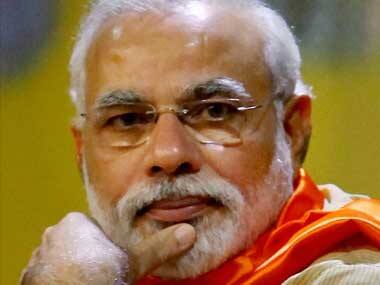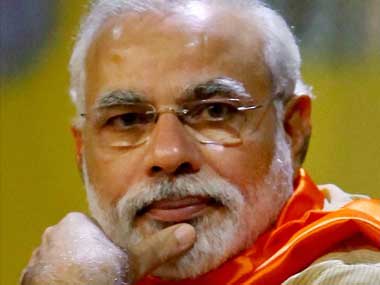By Padma Rao Sundarji Reacting to news reports in the Indian media that German chancellor Angela Merkel has invited PM Narendra Modi to turn a mere layover in Frankfurt on 11 July into a two-day trip to German capital Berlin, an official spokesman in Berlin said that he would “neither confirm nor deny” that Merkel had indeed extended such an invitation. “In any case, we do not confirm the arrival of any state guest till a few days before he/she actually arrives,” the source said. Other insiders in Berlin’s “power corridors”, indicated that contrary to Indian media reports, it is precisely because Merkel is still trying to attend the FIFA World Cup final on 13 July in Brazil, that there is a delay in firming up a date for a Modi-Merkel rendezvous . This rings true. [caption id=“attachment_1601981” align=“alignleft” width=“380”]  Primke Minister Narendra Modi. PTI[/caption] MEA spokesman, Syed Akbaruddin, too, on Thursday said that even the date for a routine ’transit halt’ in Germany—that was all that was currently under planning, for the PM on his way to Brazil to attend a BRICS summit slated 14-16 July—was not finalized and could be ’nearer to July 14th". (By which time of course, Merkel could be back in Berlin to meet the Indian PM, even if briefly). But how important is it for a German chancellor to attend a game of football in faraway Brazil ? More so, if the trade and investment-friendly prime minister of an all-important emerging economy happens to be passing through town? (One, who has been wooed by all industrialized nations eager for investment opportunities including the German ambassador to India, Michael Steiner, at whose breakfast meeting for EU ambassadors last year, former Gujarat CM Modi was the only invited Indian guest)? “Previous chancellors Helmut Kohl and Gerhard Schröder, too, flew to some World Cup fixtures when Germany played, but for us Germans, their presence is really nothing more than a public relations exercise,” says veteran political analyst Hermann Denecke in Berlin . “Merkel’s personal passion for football is well-known, though her attempt to grab eyeballs at home by barging into the players’ dressing room after Germany’s first World Cup game—and win—some weeks ago was seen by many here as a cheap—even if successful—PR exercise.” The former South Asia correspondent for ARD First German Radio Network in New Delhi also points out, that it hardly escaped anyone’s notice in Germany, that Merkel’s ‘hasty’ 20-minute meeting with Brazilian president, Dilma Rousseff, was positioned just before the German football team’s first win in Brazil, to which Merkel had flown on her official plane. “An official meeting can always justify a long-distance trip and make a personal passion seem like a ‘just-happened-to-here’ fringe event,” Denecke said. Either way and given the breathtaking speed with which international leaders have been both inviting Modi, as well as arriving at his doorstep in the barely two months since he took up office, it is certain that New Delhi is not going to wait for Germany’s advancement in the World Cup and for PM Modi to be ‘factored in’, almost as an ‘after-thought’. If Berlin is serious about competing in the wide arena of investment and trade possibilities that have opened up under the new Indian government, it—like its football team at the coming games—will have to shed its traditionally cautious approach and go for the jugular. German investment in areas crucial to India like defense, have lagged, due to Berlin’s traditional reticence in weapons transfers but also an inherent inflexibility, unlike its fiercest competitor and big neighbour France. French Foreign Minister Laurent Fabius, was—in merely two days in India last week—on the roll. He met everyone, promised investment—even pinned an award on Shahrukh Khan’s lapel in between more important engagements - and pushed hard for the completion of the $12 billion sale to India of France’s Dassault Rafale MMRC fighters, one of two aircraft types (the other being the German consortium EADS’ Eurofighter), which the Indian Air Force had identified as the two best possible purchases last year. A cruel irony, that Germany’s opponent in Friday’s quarter-final of the FIFA world cup, too, will be France. “The French are more flamboyant in their business dealings especially in the military sector”, says Rahul Bedi, correspondent for Jane’s Defence Weekly. “The Germans get lost in the detail and are unable to comprehend and cope with local cultures adequately.” A warning for Germany? Indian defence experts say that while the Eurofighter—which is still being pushed hard in India by the German-led consortium which built it—may still have a slim chance, the France-India deal over the Dassault is “2/3rds of the way already done”. “If the Germans want to, they must find a way of checkmating the 1/3rd that remains undone, mainly over pricing,” they suggest. Is anybody in Berlin reading this ? (Padma Rao Sundarji is a senior freelance South Asia correspondent for the German media. Some inputs from Dorothea Riecker, India correspondent for Germany’s Focus magazine, currently in Europe)
German investment in areas crucial to India like defense, have lagged, due to Berlin’s traditional reticence in weapons transfers but also an inherent inflexibility, unlike its fiercest competitor and big neighbor France.
Advertisement
End of Article
Written by FP Archives
see more


)

)
)
)
)
)
)
)
)



